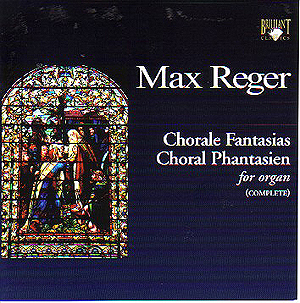The
first time I ever set foot outside the United Kingdom was on a
school holiday to Freiburg im Breisgau in the Black Forest in
1970. With a few friends and, inevitably, a teacher or two, I
attended an organ recital there one evening and I cherish the
memory of how our English teacher reacted to it. She was a highly
cultured woman, and I was surprised to hear her say that she had
the impression that the music, the instrument and the way it was
played had all been deployed in such a way as to get you down.
This two CD set of the Chorale Fantasias of Max Reger is excellent
in most respects, yet I can well imagine that she would react
to it in the same way as she did to that recital all those years
ago.
Max
Reger was a highly prolific composer whose catalogue of works
features examples in most forms with the notable exception of
opera. To listeners new to his music the simplest way to describe
it is to say that he tried to emulate J.S. Bach by means of his
own late Romantic musical vocabulary. He composed only absolute
music, with no programmatic element whatever, so itís not surprising
to find him relying on all manner of contrapuntal device, notably
fugue. However, even if his aims were to recreate the purity of
expression of Bach, the results are quite different, possibly
because of his own rather limited understanding of the earlier
composer. Even allowing for the differences which follow inevitably
from the two centuries between them, Regerís music quite singularly
lacks Bachís harmonic logic and sense of organic growth even where
it shares the constant surface movement of Bachís style. Listening
to the organ works of Bach we are struck by how the harmony becomes
a protagonist in a kind of drama, leading the ear (and the mind)
through a landscape full of tension and resolution with a serene
but irresistible logic. Regerís harmonic style is far more diffuse
and even seemingly random; we are confronted with repeated modulations
far from the original key, often within a single phrase, leaving
us floundering and disorientated. Thereís no denying the cumulative
power of these pieces, though the sheer mass of sound is partly
responsible for that; and that power seems present at the expense
of other elements we might have hoped for, such as variety of
texture and colour.
Those
who know their Bach will immediately recognise many of the chorales
used here. A typical treatment of a chorale is to begin with a
forthright statement of the melody, heavily scored, then to subject
it to more or less intricate variation, usually by way of contrapuntal
additions rather than transformation of the melody itself. The
chorale melody is quite obviously present for long stretches of
time, which certainly helps the listener find his way around the
piece. The pieces tend to close with a big statement of the chorale,
often in the pedals, accompanied by massive chords or rhythmic
or motivic figures which have been present throughout.
The
organ used on the first disc, in the Grote Kerk at Breda, arrived
at its present form only in 1966, having its origins in an organ
dating from the first half of the sixteenth century. It is certainly
a splendid instrument, and is, to my ears, perfectly suited to
the repertoire, as is the spectacular organ at Nijmegen which
features on the second disc. Both instruments are recorded quite
close in very reverberant acoustics. The sound in forte
and fortissimo passages is quite spectacularly impressive,
but the long reverberation time, especially on the second disc,
poses almost insoluble problems for the engineers in the more
complex passages, and textures do sometimes become very muddy
indeed. A pity, too, that the engineers responsible for the first
disc decided to foreshorten slightly the decay of the final chords
of each piece. Why they should be so impatient is anybodyís guess,
but given the overall quality of the sound, and the challenge
that recording this music in these churches must have posed, it
seems a pity to take away part of the very character of the building
by overzealous use of the slider controls.
The
Brilliant Classics philosophy is of course collections like this
one and I imagine that anyone who wants one Reger Choral Fantasia
will be happy to have them all. There seems little point in comparing
any one of these performances with other individual readings.
Listening to these works without a score it is difficult in any
case to assess the quality of Wouter van den Broekís playing,
but it does seem very accomplished and, above all, convincing,
so itís difficult to imagine that anyone acquiring this set as
a way of getting to know these particular pieces will be disappointed.
I have certainly found it very interesting to make the acquaintance
of this music, but I will also be looking out for other recordings
if only to see to what extent another point of view will throw
new light on this particular music. The discs are very cheap,
of course, and there really is no reason to hesitate if the programme
appeals. The booklet notes are informative Ė there is quite a
lot about the two instruments Ė but they have been translated
into English by someone whose command of the language seems only
moderate.
Many
of my musical acquaintances over the years, especially the organists,
have warmly recommended that I get to know the music of Max Reger.
Iím still learning, but to my ears thereís no escaping a certain
dour quality, a relentlessness, a feeling that everything is overscored,
even the quieter passages. And when those pedals get going at
full blast, often combined with highly intricate contrapuntal
figuration in the hands Ė try Alle Menschen müssen sterben
to hear what I mean Ė I do tend to sympathise with my former English
teacher.
William
Hedley
